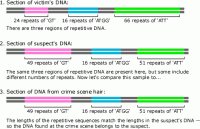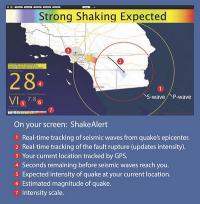-
Actions can change outcomes of wildfires in wildland urban interface (WUI)

The ten years since 2002 saw an annual average of nearly 71,000 wildland urban interface (WUI) fires recorded and 1.9 million hectares (4.7 million acres) burned. Today, more than 32 percent of U.S. housing units and one-tenth of all land with housing are situated in the nation’s 89 million hectares (220 million acres) of WUI, putting approximately 72,000 communities and more than 120 million people at risk. A new study demonstrates that prompt and effective action can significantly change the outcome of fires that occur in WUI — areas where residential communities and undeveloped wildlands meet.
-
-
Fighting fire with research results
Every year, devastating forest fires take place in Europe and around the world, destroying thousands of hectares of forests and severely impacting citizens and the environment. EU-funded research teams, mindful of the current and future risks, have been focusing their efforts on developing systems and tools that can help avert disaster.
-
-
Berkeley modifies Suspicious Activity Reports guidelines
The Berkeley City Council members said in a meeting last week that Suspicious Activity Reports (SARs), an initiative of the DHS which, through regional and national agencies, disseminates to local law enforcement information on possible terrorist threats, has the potential of criminalizing innocent people. Members of the council agreed that in order to prevent hurting innocent people, the council should adopt a Police Review Commission recommendation to modify Berkeley Police Department orders on Suspicious Activity Reporting. The modification aims to make sure that SARs can be filed “only if there is reasonable suspicion that the individual is involved in criminal conduct.”
-
-
U.K., U.S. responds differently to Snowden’s revelations about domestic surveillance
Legal analysts note that the United States and the United Kingdom have responded differently to the Snowden revelations. While in the United States steps have been taken to limit the NSA’s domestic surveillance powers, the United Kingdom is going in the other direction. The British government on Wednesday published draft legislation on surveillance and investigative powers – a legislation which is the government’s response to the documents leaked by Snowden. The U.K.’s draft bill not only embeds bulk data collection in law, but it enhances the surveillance and investigative powers of law enforcement and intelligence agencies.
-
-
DNA identification may not be as reliable as previously thought

Increasingly important to criminal investigations, DNA analysis once required substantial samples of blood or other bodily fluids, but advances in the field now make it possible to produce a complete genetic profile of a suspect from just a few cells left behind — so-called “touch DNA.” A new study shows that secondary transfer of human DNA through intermediary contact is far more common than previously thought, a finding that could have serious repercussions for medical science and the criminal justice system.
-
-
West Coast lawmakers ask Obama for $16.1 million to complete earthquake early warning system

Last Wednesday thirty-six Members of Congress from western states urged President Barack Obama and the White House’s Office of Management and Budget to increase the funding level for earthquake hazards programs in their 2017 budget request — more specifically, to provide $16.1 million dollars in funding for an on-shore Earthquake Early Warning System (EEW) being developed by scientists in Southern California and along the West Coast. The lawmakers say that such an early warning system would be helpful in providing residents and first responders with advance notice that could help save lives, avoid injuries, and avert major infrastructure damage by slowing trains to prevent derailment, stopping elevators, pausing surgeries, and taking other actions in the event of a major earthquake.
-
-
Climate change heightening the risk of conflict and war
Thirty of Australia’s leading minds from defense, academia, policy think tanks, and other government agencies have joined together for discussions over two days last week for Australia’s first climate security summit. The summit participants agreed that increasing temperatures, rising sea levels, changing rainfall patterns, and more frequent and severe extreme weather events are heightening the risk of conflict and increasing the displacement of people. The summit organizers quote Brigadier-General Wendell Christopher King (Ret.), the Chief Academic Officer at the U.S. Army’s Command and General Staff College, who said: “[Climate change] is like getting embroiled in a war that lasts 100 years — there is no exit-strategy.”
-
-
U.K. surveillance bill debate: Judicial warrants vs. ministerial authorization for intercepts
Former Conservative shadow home secretary David Davis has said that the plans to grant police and intelligence agencies new powers to monitor suspects online will not get through parliament without a requirement for judges to sign off on spying warrants. A legal report written at the request of Home Secretary Theresa May recommended that judicial warrant rather than a ministerial authorization be required for intercepting individuals’ communications. Parliament’s Intelligence and Security Committee, however, recommended in March that ministerial authorization would be preferable. A draft of a new investigatory powers bill will be published Wednesday, and May said she would “be explaining the government’s position to parliament this week.”
-
-
Legislation would give U.K. police powers to access U.K. computer users’ browsing history
The U.K. police and intelligence service, ahead of the publication this coming Wednesday of legislation on regulating surveillance powers, have urged the government to give them the power to view the Internet browsing history of British computer users. Senior officers were pressuring the government to revive measures which would require telecommunications companies to retain for twelve months data which would reveal Web sites visited by customers. The police and intelligence agencies argue that such measures are necessary because the scale of online activity has made traditional methods of surveillance and investigation less useful.
-
-
IRS commissioner confirms agency employs cellphone tracking devices

IRS commissioner John Koskinen on Tuesday confirmed to lawmakers that his agency employed StingRay cellphone tracking devices. Koskinen said that the agency’s use of StingRay devices is limited to its criminal investigations division, which is responsible of investigating money laundering, terrorism, and organized crime cases. “It can only be used with a court order. It can only be used based on probable cause of criminal activity,” Koskinen said, the Hill reports. “It is not used in civil matters at all,” he continued. “It’s not used by other employees of the IRS.”
-
-
Online residential fire simulation tool for training firefighters
Firefighting is not what it used to be. Whether it is a complex blaze raging in an urban high-rise or a seemingly straightforward single-level home fire, modern building construction and furnishings have made fighting fires more difficult: Flames burn hotter, produce more smoke, and spread more quickly. But fire research has advanced, too, and researchers are working with five major urban fire departments to build new knowledge on modern residential firefighting into game-based online simulations with an engaging, dynamic format.
-
-
Steam thermography may compete with luminol in solving crimes
Luminol gets trotted out pretty frequently on TV crime shows, but a new technique might someday compete with the storied forensics tool as a police procedural plot device and, perhaps more importantly, as a means of solving real crimes. Researchers developed what they term “steam thermography,” which has the ability to detect blood spots in all kinds of spots — even in spots where luminol cannot.
-
-
Ruling shows Europe still vexed over NSA spying, leaving U.S. companies in legal limbo
For over fifteen years, the Data Transfer Pact between the European Union and the United States, more commonly known as Safe Harbor, had ensured that companies with EU operations could transfer online data about their employees and customers back to the United States despite stark differences between U.S. and European privacy law. Earlier this month, U.S. companies operating in Europe got some unwelcome news: Safe Harbor had been ruled invalid. The European court’s ruling has serious implications for these companies’ business models and profitability, leaving many scrambling to find solutions. But it also exposes a fundamental cultural rift between the U.S. and Europe’s conceptions of privacy – one that a new agreement won’t be able to paper over.
-
-
Design competitions needed to maintain U.S. nuclear deterrent
Preserving the U.S. nuclear weapon design skills is essential for sustaining a credible nuclear deterrent, understanding the status and direction of foreign nuclear weapons programs, and determining the best solutions to problems that arise during stockpile surveillance and maintenance. In the absence of nuclear explosion testing, the National Nuclear Security Administration (NNSA) should develop a series of design competitions that integrate the full end-to-end design process from novel design conception through production and non-nuclear testing of an engineered prototype, says a new report.
-
-
W80-4: Sandia California works on nuclear weapon Life Extension Program
Sandia National Laboratories is doing what it has not done in decades: extending the life of a nuclear warhead at the same time the U.S. Air Force develops a replacement cruise missile that will carry the weapon. The goal of the W80-4 Life Extension Program (LEP) is refurbishing the W80 warhead with replacement components for aging technology and components that have limited lifespans.
-
More headlines
The long view
Tantalizing Method to Study Cyberdeterrence
Tantalus is unlike most war games because it is experimental instead of experiential — the immersive game differs by overlapping scientific rigor and quantitative assessment methods with the experimental sciences, and experimental war gaming provides insightful data for real-world cyberattacks.
Using Drone Swarms to Fight Forest Fires
Forest fires are becoming increasingly catastrophic across the world, accelerated by climate change. Researchers are using multiple swarms of drones to tackle natural disasters like forest fires.
Testing Cutting-Edge Counter-Drone Technology
Drones have many positive applications, bad actors can use them for nefarious purposes. Two recent field demonstrations brought government, academia, and industry together to evaluate innovative counter-unmanned aircraft systems.
European Arms Imports Nearly Double, U.S. and French Exports Rise, and Russian Exports Fall Sharply
States in Europe almost doubled their imports of major arms (+94 per cent) between 2014–18 and 2019–23. The United States increased its arms exports by 17 per cent between 2014–18 and 2019–23, while Russia’s arms exports halved. Russia was for the first time the third largest arms exporter, falling just behind France.
How Climate Change Will Affect Conflict and U.S. Military Operations
“People talk about climate change as a threat multiplier,” said Karen Sudkamp, an associate director of the Infrastructure, Immigration, and Security Operations Program within the RAND Homeland Security Research Division. “But at what point do we need to start talking about the threat multiplier actually becoming a significant threat all its own?”
The Tech Apocalypse Panic is Driven by AI Boosters, Military Tacticians, and Movies
From popular films like a War Games or The Terminator to a U.S. State Department-commissioned report on the security risk of weaponized AI, there has been a tremendous amount of hand wringing and nervousness about how so-called artificial intelligence might end up destroying the world. There is one easy way to avoid a lot of this and prevent a self-inflicted doomsday: don’t give computers the capability to launch devastating weapons.
